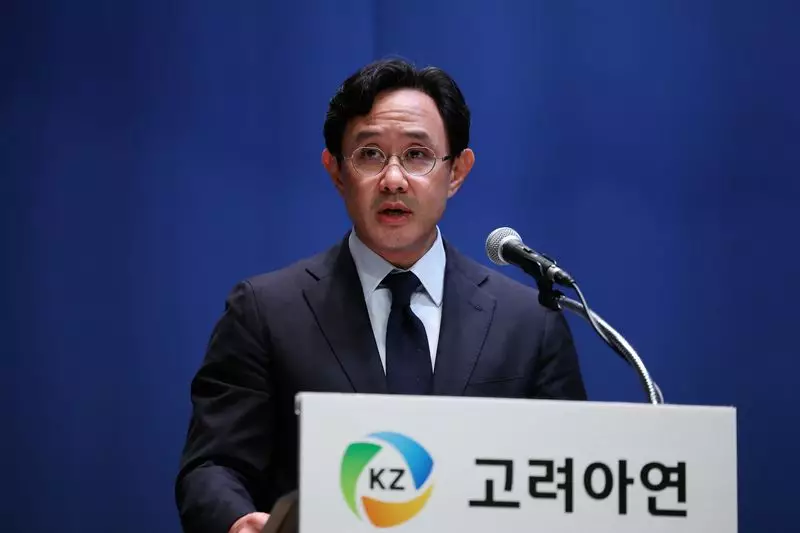Korea Zinc, recognized as the world’s leading zinc refiner, recently encountered a significant setback as it opted to retract its ambitious plan to issue new shares worth $1.8 billion. This decision was precipitated by a slew of external pressures, including an investigation from South Korea’s financial watchdog and a noticeable erosion of investor confidence, leading to a turbulent sell-off in the company’s stock. The intricate ramifications of this decision resonate deeply within a broader narrative of corporate governance and shareholder activism, laying bare the fierce struggles between founding family factions and investment entities.
Korea Zinc’s announcement to withdraw the share issuance proposal reflects a profound sense of market awareness and a reactionary approach to shareholder concerns. In a statement issued by the company, they acknowledged the necessity of addressing the “concerns from the market and shareholders.” This sentiment indicates a shift in the company’s strategy, as they pivot towards a demonstration of long-term vision amidst escalating tensions related to its ownership dynamics. For Korea Zinc’s Chairman, Yun B. Choi, the withdrawal signifies not only a tactical retreat from immediate financial maneuvers but also highlights the increasing complexity of its relations with major stakeholders like Young Poong and MBK Partners.
Initially, the planned share issuance seemed to serve as a defensive barrier against the encroaching influence of these two entities, who have aggressively increased their stake to approximately 40% following a recent tender offer. In stark contrast, Choi and his allies hold a significantly lesser portion, around 35%. This imbalance illustrates the precariousness of the corporate landscape at Korea Zinc, potentially jeopardizing Choi’s leadership and strategy. The decision to forgo the share issuance underscores a growing recognition of the need for stability as the company faces a shareholder meeting that may determine its future governance.
Following the announcement to withdraw the share issuance plan, Korea Zinc’s stock exhibited volatility, initially rising but subsequently declining by 7% in afternoon trading. This erratic behavior of the stock price underscores investor uncertainty and the heavy influence that corporate governance issues wield over market perceptions. The South Korean Financial Supervisory Service (FSS) has also instigated an investigation into the circumstances surrounding the shares’ planned issuance, raising concerns about potential unfair practices. This situation points to an increasing need for transparency and accountability at Korea Zinc, elements that have become central in contemporary discussions around corporate governance.
This scrutiny raises vital questions regarding the motivations behind Korea Zinc’s actions. The timing of the share buy-back prior to the new issuance plan adds a layer of complexity to the narrative. Investors were left grappling with perceived inconsistencies in management’s strategy, which ultimately necessitated the FSS’s intervention and has led to a poignant reflection on governance practices within the company.
The stage is now set for an impending shareholder meeting, where the stakes could not be higher. Young Poong and MBK Partners are not merely passive observers; they have actively sought judicial approval to convene a special meeting to nominate 14 new board members, eclipsing the current board’s composition. This bold move reflects their intent to reshape the governance structure decisively and strengthen their foothold within the company.
As the court sanctions the meeting, it is expected that both sides will vie for the favor of shareholders, including the influential National Pension Service, which controls a significant stake. Choi is anticipated to counter with his nominees for independent directors, a tactic designed to curry favor from institutional investors. The impending confrontation at the shareholder meeting raises critical issues regarding the future direction of Korea Zinc, signaling a moment of potential transformation amid ongoing conflicts of interest.
Korea Zinc finds itself at a defining crossroads, caught in a whirlwind of regulatory scrutiny, shareholder unrest, and a power struggle that could irrevocably alter its trajectory. As investors await the unfolding of events at the special meeting, the dual realities of corporate governance and shareholder activism are starkly exposed. The outcomes of these battles are not merely limited to board compositions or share prices; they encapsulate broader themes of accountability, vision, and leadership within a corporation at the heart of a global industry. In this tumultuous environment, stakeholders will closely watch how Korea Zinc navigates the storm and whether it can realign itself towards a stable future.

